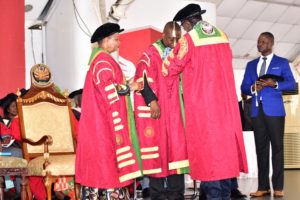
Accra, October 18, 2017//-Ghana’s Minister of State in charge of Tertiary Education, Prof. Kwesi Yankah, has revealed that the current system of mentoring and affiliation – wherein a private university college understudies a public university until the private university college becomes mature – will soon be abolished.
“Indeed, sweeping reforms in tertiary education are underway and waiting to be announced,” he said at the 15thGraduation Ceremony of the Catholic University College in Sunyani.
“Government is in search of viable alternatives to the current system of mentoring and affiliation that will soon be abolished. We should be able to simplify the bureaucracy in setting up a university, which should raise rather than lower standards in university education,” he said.
He said the perception that private universities are expensive is partly due to a nuisance-tax as well as expensive accreditation processes whose cost outcomes are then passed on to students.
“Remove these impediments in the way of the private sector and tuition fees will go down,” said Prof. Yankah, who was Vice Chancellor of one of the leading private universities in the country – Central University College.
Government, he said, has started processes toward reforms that will help make private universities less expensive – indicating that accreditation processes, policies in the setting up of universities, the efficacy of mentoring as currently practiced, as well as inequities in laws as applied to private and public universities, have been reviewed by reform committees.
In recent times, the Council of Independent Universities (CIU) has argued that the affiliation system, wherein a private university college understudies a public university until the private university college becomes mature and receives a presidential charter to run its own graduate programmes, has become a major source of revenue for the mentor universities as exorbitant fees are charged for it.
“It would be in the interest of affordable tertiary education for affiliation and accreditation fees to be reviewed downward, and the new arbitrary fees by mentor universities withdrawn,” the Council said.
Some public universities have said they can no longer take on new programme affiliations because their hands are full, while others have restricted to three any new programmes that university colleges can introduce in a year under their mentorship.
Currently, an admission fee of US$15 per student is levied by a mentoring institution to be paid by an affiliate university college, which according to the Council of Independent Universities – made up of heads of accredited private universities and universities colleges – makes private university education very expensive in the country.
Apart from the levies by mentoring institutions, university colleges pay an accreditation fee – which has increased from GH¢2000 to GH¢6,000 – to the National Accreditation Board (NAB) for accreditation renewals and approval of new programmes.
Private universities also pay the renewal fees of GH¢4,000 after a payment of GH¢20,000 institutional accreditation to the NAB.
Presently, there are about 72 accredited tertiary institutions in the country operating as public and private universities. Out of this number, only 14 are chartered degree-awarding universities which, by law, have the powers to confer degrees.
Valley View University, Trinity Theological College, Akrofi-Christaller Memorial Research Institute and Central University are the only chartered private tertiary institutions eligible to award degrees.
Funding
Private universities, including their student-bodies, have also been asking for allocations from the GETFUND, which is a dedicated fund for education.
According to them, most private university collages meet the funding for staff development from internally generated funds; and as these institutions expand and initiate more degree programmes, the cost of graduate training increases.
B&FT
.




